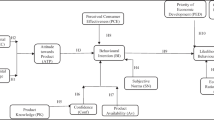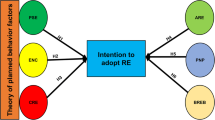Abstract
This paper aims to employ behaviour change theories in predicting consumers’ intention of buying energy-efficient products. A stratified sampling of 500 face-to-face interview questionnaires was used in two regions of Peninsular Malaysia. The findings from the evaluation of absolute indices of the structural model showed that the criterion of the model is good-of-fit with values greater than 0.9. Besides, the analysis of the direct effect model also found that consumers’ intention to buy energy-efficient products is influenced by perceived product values. As for the indirect model, attitude determines the relationship between consumers’ perceived product value, subjective norm, responsibility and intention to buy energy-efficient products. A consumer’s perception of product values and attitude is crucial for consumers to form a more favourable mindset towards these green innovation products. In addition, the communication initiatives that develop consumers’ trust about the benefits of the products are some of the various ways to encourage consumers’ purchasing behaviour. Hence, this study attempts to provide a valuable insight into Malaysian consumers’ behaviour regarding energy-efficient products. Furthermore, this study extends an application of the behavioural theories by examining variables in a composite model. The findings of the study suggest that policy makers should thoroughly set the interventions to harmonise the traditional approach using rebates and subsidised incentives since behavioural interventions are considered to be valuable complements when they are jointly implemented.
Similar content being viewed by others
References
Abd Rahman NA, Kamaruzzaman SN, Akashah FW (2019) Scenario and strategy towards energy efficiency in Malaysia: a review. MATEC Web of Conference 266, 02012. https://doi.org/10.1051/matecconf/201926602012
Ajzen I (1985) From intentions to actions: a theory of planned behavior. In: Kuhl J, Beckmann J (eds) Action control from cognition to behaviour. Springer, Berlin, Germany, pp 11–39
Ajzen I (1991) The theory of planned behavior. Organ Behav Hum Decis Process 50(2):179–211
Akroush MN, Zuriekat MI, Al Jabali HI, Asfour NA (2019) Determinants of purchasing intentions of energy-efficient products: the roles of energy awareness and perceived benefits. Int J Energy Sect Manage 13(1):128–148. https://doi.org/10.1108/IJESM-05-2018-0009
Ali A, Ahmad A (2012) Environment friendly products: factors that influence the green purchase intentions of Pakistani consumers. Pak J Eng Technol Sci 2(1):84–117
Baron RM, Kenny DA (1986) The moderator-mediator variable distinction in social psychological research: conceptual, strategic, and statistical considerations. J Pers Soc Psychol 51:1173–1182
Bornemann B, Sohre A, Burger P (2018) Future governance of individual energy consumption behavior change—a framework for reflexive designs. Energy Res Soc Sci 35:140–151
Camara NF, Xu D, Binyet E (2018) Enhancing household energy consumption: how should it be done? Renew Sustain Energy Rev 81:669–681
Chan RYK (2001) Determinants of Chinese consumers’ green purchase behaviour. Psychol Mark 18(4):389–413
Chan RY, Lau LB (2001) Explaining green purchasing behavior: a cross-cultural study on American and Chinese consumers. J Int Consum Mark 14(2/3):9–40
Chen CD, Fan YW, Farn CK (2007) Predicting electronic toll collection service adoption: an integration of the technology acceptance model and the theory of planned behavior. Transport Res C 15:300–311
Cherian J, Jacob J (2012) Green Marketing : a Study of Consumers’ Attitude towards Environment Friendly Products. Asian Social Sci 8(12):117–126. https://doi.org/10.5539/ass.v8n12p117
Davis FD (1993) User acceptance of information technology: system characteristics, user perceptions and behavioral impacts. Int J Man Mach Stud 38:475–487
Davis FD, Bagozzi RP, Warshaw PR (1989) User acceptance of computer technology: a comparison of two theoretical models. Manage Sci 35(8):982–1003
DOS (2020) Department of Statistics of Malaysia. Housing statistics. https://www.dosm.gov.my/v1/index.php?r=column/
EC (2017) Energy Commission of Malaysia. Energy Malaysia, vol 12. www.st.gov.my
EC (2019) www.st.gov.my
Fishbein M, Ajzen I (1975) Belief, attitude, intention and behavior: an introduction to theory and research. Addison-Wesley, Reading, MA
Guo Z, Zhou K, Zhang C, Lu X, Chen W, Yang S (2018) Residential electricity consumption behaviour: influencing factors, related theories and intervention strategies. Renew Sustain Energy Rev 81:399–412
Ha HY, Janda S (2012) Predicting consumer intentions to purchase energy-efficient products. J Consum Mark 29(7):461–469. https://doi.org/10.1108/07363761211274974
Ha HY, Janda S (2017) Predicting consumer intentions to purchase energy-efficient products. In: Campbell CL (ed) The customer is NOT always right? Marketing orientations in a dynamic business world. Developments in marketing science: proceedings of the academy of marketing science. Springer, Cham. https://doi.org/10.1007/978-3-319-50008-9_249
Hair J, Black B, Babin B, Anderson R, Tatham R (2006) Multivariate data analysis. Pearson Education, Upper Saddle River, NJ
Harland P, Staats H, Wilke HAM (1999) Explaining proenvironmental intention and behavior by personal norms and the theory of planned behavior. J Appl Soc Psychol 29(12):2505–2528
Iravani MR, Zadeh MS, Forozia A, Shafaruddin N, Hmidreza M (2012) Study of factors affecting young consumers to choose green products. J Basic Appl Sci Res 2(6):5534–5544
Jeevarathnam PG, Tushya LG (2016) The influence of green marketing on consumer purchase behaviour. Environ Econ 7(2):77–85
Kaiser FG, Hubner G, Bogner FX (2005) Contrasting the theory of planned behavior with the value-belief-norm model in explaining conservation behaviour. J Appl Soc Psychol 35(10):2150–2170
KeTTHA (2015) Ministry of Energy, Green Technology and Water. National Energy Efficiency Master Plan
Kim HY, Chung JE (2011) Consumer purchase intention for organic personal care products. J Consum Mark 28(1):40–47. https://doi.org/10.1108/07363761111101930
Lau JL, Hashim AH (2019) Mediation analysis of the relationship between environmental concern and intention to adopt green concept. Smart Sustain Built Environ 9(4):538–556
Ma Q, Liu L (2004) The technology acceptance model: a meta-analysis of empirical findings. J Organization End User Comput 16(1):59–72
Mei OJ, Ling KC, Piew TH (2012) The antecedents of green purchase intention among Malaysian consumers. Asian Soc Sci 8(13):248–263. https://doi.org/10.5539/ass.v8n13p248
Mizobuchi K, Takeuchi K (2013) The influences of financial and non-financial factors on energy-saving behaviour: a field experiment in Japan. Energy Policy 63:775–787. https://doi.org/10.1016/j.enpol.2013.08.064
NST (2020) https://www.nst.com.my/news/nation/2020/12/649246/malaysia-needs-green-new-deal-say-experts
Oliver JD, Lee S-H (2010) Hybrid car purchase intentions: across-cultural analysis. J Consum Mark 27(2):96–103
Pelenur M (2018) Household energy use: a study investigating viewpoints towards energy efficiency technologies and behaviour. Energ Effi 11:1825–1846. https://doi.org/10.1007/s12053-018-9624-x
Pelenur MJ, Cruickshank HJ (2012) Closing the energy efficiency gap; a study linking demographics with barrier to adopting energy efficiency measures in the home. Energy 47:348–357. https://doi.org/10.1016/j.energy.2012.09.058
Pelenur MJ, Cruickshank HJ (2014) Motivations to adopting energy efficiency measures in the home. ICE Proc. https://doi.org/10.1680/ener.14.00013
Pickett-Baker J, Ozaki R (2008) Pro-environmental products: marketing influence on consumer purchase decision. J Consum Mark 25(5):281–293
Pimdee P (2017) Causal relationship model of Thai student energy conservation behaviour. J Sustain Sci Manage 12(2):218–227
Poortinga W, Stec L, Vlek C (2004) Values, environmental concern, and environmental behavior. Environ Behav 36(1):70–93
Rahimah A, Khalil S, Cheng JMS, Tran MD, Panwar V (2018) Understanding green purchase behavior through death anxiety and individual social responsibility: mastery as a moderator. J Consum Behav 17(5):477–490. https://doi.org/10.1002/cb.1733
Rahman KA, Leman AM, Salleh MMN (2016) Consumer awareness in energy efficiency for residential houses in peninsular Malaysia. MATEC web of conference, 78, 01010. https://doi.org/10.1051/matecconf/20167801010
Rogers EM (2003) Diffusion of innovations, 5th edn. Free Press, New York, NY
Salleh SF, Mohd Isa A, Roslan ME, Tuan Abdullah TAR (2019) IOP Conf. Ser.: Earth Environ. Sci. 288 012012
Schwartz SH (1977) Normative influences in altruism. In: Berkowitz L (ed) Advances in experimental social psychology, vol 10. Academic Press, New York, NY, pp 221–279
Simanaviciene Z, Volochovic A, Vilke R, Palekiene O, Simanavicius A (2015) Research review of energy savings changing people’s behavior: a case of foreign country. Proc Social Behav Sci 191:1996–2001. https://doi.org/10.1016/j.sbspro.2015.04.315
Sobel ME (1982) Asymptotic confidence intervals for indirect effects in structural equation models. In: Leinhardt S (ed) Sociological methodology, vol 13. Jossey-Bass, San Francisco, pp 290–312
Sobel ME (1986) Some new results on indirect effects and their standard errors in covariance structure models. Sociol Methodol 16:159–186
Soyez K (2012) How national cultural values affect pro-environmental consumer behavior. Int Mark Rev 29(6):623–646. https://doi.org/10.1108/02651331211277973
Stern PC, Dietz T, Abel T, Guagnano GA, Kalof L (1999) A value-belief-norm theory of support for social movements: the case of environmentalism. Hum Ecol 6(2):81–97. https://doi.org/10.2307/2083693
Tan CS, Ooi HY, Goh YN (2017) A moral extension of the theory of planned behavior to predict consumers’ purchase intention for energy-efficient household appliances in Malaysia. Energy Policy 107(C):459–471
Tarkiainen A, Sundqvist S (2005) Subjective norms, attitudes and intentions of Finnish consumers in buying organic food. Br Food J 107:808–822
Tonglet M, Phillips PS, Read AD (2003) Using the theory of planned behaviour to investigate the determinants of recycling behaviour: a case study from Brixworth, UK. Resour Conserv Recycl 41:191–214
Tsay Y-Y (2010) The impact of economic crisis on green consumption in Taiwan. Paper presented at the PICMET 2009
Van Birgelen M, Semeijn J, Keicher M (2009) Packaging and pro-environmental consumption behaviour: investigating purchase and disposal decisions for beverages. Environ Behav 41(1):125–146
Vasseur V, Marique AF (2019) Households’ willingness to adopt technological and behavioral energy savings measures: an empirical. Energies 12:4294
Yeoh M, Paladino A (2008) Analysing the effects of prestige of environmental attitudes and behaviours upon low-involvement purchase: does branding matter? Proceeding of Australian and New Zealand Marketing Academy Conference 2007, 3–5 December 2007. University of Otago, Dunedin, New Zealand, pp 2066–2074
Zainudin N, Siwar C, Er AC, Norshamliza C (2017) Household’s energy efficiency behavior: the role of knowledge, attitude and social influences. Sci Int 29(2):189–193
Acknowledgements
The researchers would like to thank the University Putra Malaysia for funding the study under its IPM Research Grant Scheme (IPM9562100). The authors would also like to thank the anonymous paper reviewers for their invaluable feedback.
Author information
Authors and Affiliations
Corresponding author
Additional information
Publisher's Note
Springer Nature remains neutral with regard to jurisdictional claims in published maps and institutional affiliations.
About this article
Cite this article
Zainudin, N., Lau, J.L. & Munusami, C. Modelling household behavioural changes as an opportunity for sustainable home energy. Environ Econ Policy Stud 24, 73–97 (2022). https://doi.org/10.1007/s10018-021-00311-z
Received:
Accepted:
Published:
Issue Date:
DOI: https://doi.org/10.1007/s10018-021-00311-z




